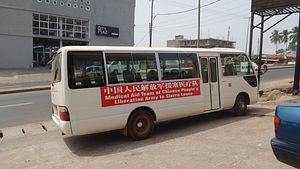Many of today’s greatest risks to global health originate in China. The latest outbreak of avian flu has claimed more than 160 lives since October 2016, triggering memories of earlier pandemics like SARS. The virus H7N9 has not yet spread to other countries, but according to international health authorities, it does have pandemic potential. According to Lloyd Risk Assessment, seven out of 20 cities most at risk of initiating a human pandemic are located in China, with an estimated GDP of $80 billion at risk for those seven cities.
As the world’s biggest consumer of human and animal antibiotics, China, whose health system is notorious for the over-prescription of antibiotics, also poses an increasing threat of spreading antimicrobial resistance. Antibiotic resistant strains of bacteria have become one of the biggest health concerns of our era, triggering urgent warnings from the World Health Organization (WHO).
China is not only a source of many serious global health problems, however. Increasingly, it also offers solutions. China was one of the first countries to provide a significant amount of financial, technical, and human resources to the three African countries that were affected by the Ebola outbreak in 2014. China’s quick and decisive response to this crisis was an important milestone in its growing integration in global health governance.
Beijing has furthermore pushed health cooperation more broadly as part of its foreign policy outreach. Since 2011, the BRICS Health Ministers have held annual meetings to discuss their cooperation, with China’s active participation. China-African health and medical cooperation is widely seen as a success story and a symbol of Beijing’s growing role as a provider of South-South support. So far, there have been six roundtables and two Ministerial Forums on China-Africa Health Development, involving 40 African countries as well as representatives from the African Union, WHO, and UNAIDS. This January, China and the WHO signed a Memorandum of Understanding on health issues within China’s Belt and Road Initiative, which aims to revive maritime and land trade routes between China and Europe. The MoU deals with health emergencies and with the certification of Chinese medicines and vaccines.
Yet, compared to China’s international economic and political weight, as well as to the relevance of the health issues at stake, China is not sufficiently engaged in multilateral global health governance. China’s financial and technical contributions to the core funding of the WHO in relation to its GDP is far below the recommended share of 0.1 percent of GDP and also significantly below that of other BRICS countries. Apart from that, Beijing has not shown strong commitment to recent global health initiatives such as the Coalition of Epidemic Preparedness Innovation (CEPI), which was initiated at the 2017 World Economic Forum in Davos. The initiative supports the development of vaccines to prevent outbreaks like Ebola.
As host country for the G20 Summit in Hangzhou last year, China missed the opportunity to prioritize global health issues. The topic was almost completely absent from the agenda, and only the persistence of countries like Germany led to a discussion and a mention of the threat of rising antimicrobial resistance in the communiqué.
The German G20 presidency has now announced that global health will be a key deliverable of the Hamburg summit. To this end, the G20 Health Working Group has started its work last December and the first G20 Health Ministers’ Meeting will be held in May in Berlin.
It is in China’s own interest to engage in these discussions and related initiatives. The Chinese representative to the G20 Health Working Group will need a strong mandate to participate in global health initiatives. Beijing can also send a strong signal by scaling up its financial and technical contributions to the WHO and other UN organizations dealing with global health issues.
China has a lot to gain from taking a more active role. Not only would its own population benefit from improving the safety net against global health threats, but China could also reap economic and reputational benefits from more engagement. China is already the largest producer of the frontline antimalarial drug artemisinin as well as the main producer of active pharmaceutical ingredients for Africa’s HIV medicines. Hence, the Chinese economy could benefit from rising exports of healthcare and pharmaceuticals. A stronger role in global health would also improve China’s image as a leading power willing to shoulder international responsibility.
Traditional donor countries would certainly welcome stronger Chinese involvement as an opportunity to share responsibilities toward Africa and the wider global South. They could also benefit from information sharing with China, which increasingly faces similar challenges as industrialized countries, for example when it comes to adjusting its health system to demographic change.
The biggest beneficiaries of a greater Chinese role would be people and communities with limited access to healthcare and low levels of preparedness for pandemics and other infections. Ensuring their health and well-being would be in line with the third of the UN’s Sustainable Development Goals. Due to China’s size and relevance, Beijing’s increased engagement could be a game changer for global health.
Charlotte Röhren contributed to the Research Program on Foreign Relations and International Security at the Mercator Institute for China Studies from January to March 2017. She is currently studying for her MA in International Relations in Berlin and Potsdam after completing her BA in Chinese, Development Studies and Economics at SOAS, University of London, and Beijing National University.

































